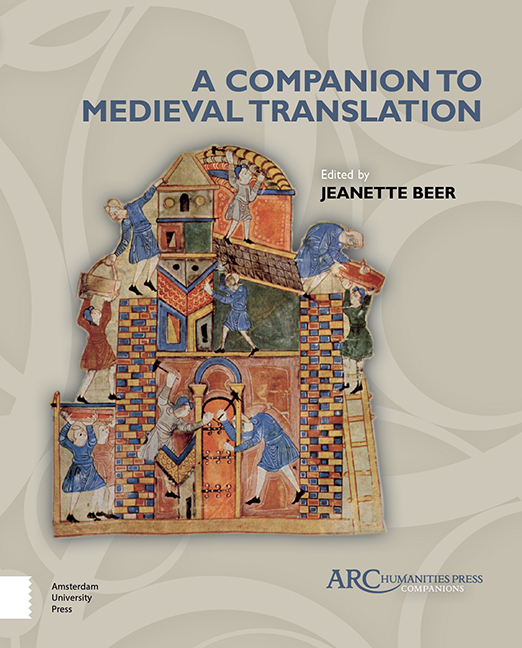Book contents
- Frontmatter
- Contents
- Acknowledgements
- Introduction
- Chapter 1 The European Psalms in Translation
- Chapter 2 The Old French Bible
- Chapter 3 Middle English Religious Translation
- Chapter 4 Bible Translation and Controversy in Late Medieval England
- Chapter 5 Medieval Convent Drama: Translating Scripture and Transforming the Liturgy
- Chapter 6 Translating Romance in Medieval Norway: Marie de France and Strengleikar
- Chapter 7 Christine de Pizan, Translator and Translation Critic
- Chapter 8 Translation, Authority, and the Valorization of the Vernacular
- Chapter 9 Vernacular Translation in Medieval Italy: volgarizzamento
- Chapter 10 Dante and Translation
- Chapter 11 Chaucer and Translation
- Chapter 12 Alchemy and Translation
- Chapter 13 Scientific Translation: A Modern Editor’s Perspectiv
- Chapter 14 Modern Theoretical Approaches to Medieval Translation
- Chapter 15 Observations on Translation by a Thirteenth-Century Maître: Li Fet des Romains
- Epilogue. Observations on Translation by the Oxford Professor of Poetry: Pearl
- General Bibliography
- Appendix
- Index
Chapter 8 - Translation, Authority, and the Valorization of the Vernacular
Published online by Cambridge University Press: 20 November 2020
- Frontmatter
- Contents
- Acknowledgements
- Introduction
- Chapter 1 The European Psalms in Translation
- Chapter 2 The Old French Bible
- Chapter 3 Middle English Religious Translation
- Chapter 4 Bible Translation and Controversy in Late Medieval England
- Chapter 5 Medieval Convent Drama: Translating Scripture and Transforming the Liturgy
- Chapter 6 Translating Romance in Medieval Norway: Marie de France and Strengleikar
- Chapter 7 Christine de Pizan, Translator and Translation Critic
- Chapter 8 Translation, Authority, and the Valorization of the Vernacular
- Chapter 9 Vernacular Translation in Medieval Italy: volgarizzamento
- Chapter 10 Dante and Translation
- Chapter 11 Chaucer and Translation
- Chapter 12 Alchemy and Translation
- Chapter 13 Scientific Translation: A Modern Editor’s Perspectiv
- Chapter 14 Modern Theoretical Approaches to Medieval Translation
- Chapter 15 Observations on Translation by a Thirteenth-Century Maître: Li Fet des Romains
- Epilogue. Observations on Translation by the Oxford Professor of Poetry: Pearl
- General Bibliography
- Appendix
- Index
Summary
The Middle Ages has been characterized as a period of cultural dualism. From at least the twelfth to the fourteenth centuries medieval authors and intellectuals were operating in a diglossic situation where Latin and the vernaculars were clearly demarcated. The distinction continued to be maintained long into the period when the European vernaculars were being used, often routinely, for functions traditionally occupied by Latin. For the fifteenth-century author Alain Chartier, prolific in both Latin and French, there was a marked divergence in the transmission of his works in either language, and his authorial identity functioned differently in each case. Chartier's Latin works were transmitted alongside classical and earlier medieval Latin texts, accruing legitimacy as a recent link in the chain leading back to antiquity. His French works meanwhile were collected with French-language texts by his contemporaries or successors; here, it was Chartier's own authority which legitimized subsequent French literary production. In a gloss to Jean Josse de Marville's De modis significandi, Henri de Crissey conceptualizes the diglossic difference as follows:
Latinorum populorum quidam laici dicuntur, et quidam clerici. Laici vero dicuntur habere ydiomata vocum impositarum ad placitum, que ydiomata docuntur pueri matribus et a parentibus, et ita idyomata multiplicia sunt apud Latinos, quia aliud est apud Gallos, aliud apud Germanos, aliud apud Lombardos seu Ytalicos. Clerici vero Latinis discuntur habere ydioma idem apud omnes eos, et istud docentur pueri in scolis a grammaticis?
(Within the Latin peoples, some are called laymen and others clerics. The laymen are said to have languages whose words have been imposed by convention, and these languages are taught to the child by its mother and relatives, and thus there are multiple languages among the Latins, since there is one for the French, another for the Germans, another for the Lombards or Italians. Among the Latins the clerics have one language which is the same for all, and which is taught to the child in schools by the grammarians.)
Henri posits a diglossic difference between two types of language: the single “ydioma” of the clerics, taught in educational establishments, contrasts with the “ydiomata multiplicia” that laypeople learn at home. The unified nature of Latin serves to define a clerical caste in society, differentiating them from the wider population, yet it also, implicitly, unites the disparate groupings of that wider lay population into a single entity, the “Latins.”
- Type
- Chapter
- Information
- Companion to Medieval Translation , pp. 97 - 106Publisher: Amsterdam University PressPrint publication year: 2019



